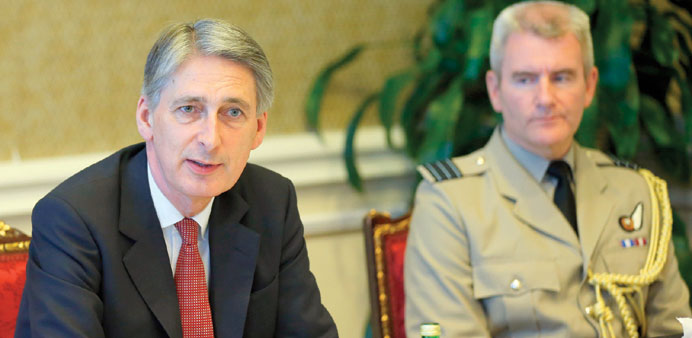|
The ‘disappointing’ situation in Syria has enabled the Bashar al-Assad regime to regroup and consolidate its position, ‘partly because of fragmentation within the opposition,’ UK’s Secretary of State for Defence Philip Hammond said yesterday. |
At a press briefing yesterday, the senior official said that 18 months back, they were all hopeful that the opposition forces could win a ‘fairly rapid success’
“(But,) it is now clear, partly because of fragmentation within the opposition, the Assad regime has been able to regroup and consolidate its position.
“We have to continue to support the moderate, democratic opposition while isolating the extremists’ opposition, but we have to recognise that this will be a much longer process of building the capability, discipline and the unity of the opposition, if they are going to be ultimately able to prevail over the Assad regime,” he said.
He said that the UK would not provide lethal support to the opposition in Syria ‘for the time being’.
“Our Qatari friends understand our legal constraints and under the current situation, we are not able to provide lethal weapons to the Syrian opposition. But we are to support them through other ways,” he said.
The other ways, include providing humanitarian support and ensuring that areas under the opposition had the rudiments to a proper civil governance. “We have provided non-lethal aid systems such as communications’ equipment and we are working with our allies to look into how we can deliver training capability,” he added.
He said that UK was closely co-ordinating with the GCC, the US and France on Syria to increase support to the ‘democratic opposition.’ “We have to be able to distinguish the democratic opposition from the extremist groups and make sure our support goes to the right people.”
The senior British official was asked to elaborate on the recent statement made by the UK prime minister, who said that the Muslim Brotherhood’s activities in Britain would be reviewed over concerns about possible links to violence.
“What Prime Minister Cameroon has ordered is a review and it is precisely that, a review to improve our understanding, to gain knowledge by collecting information from countries around the Middle East.”
He said that the MB was a phenomenon in many states, where it was involved in government in some places and acknowledged that it was not necessarily a singular organisation across all the states. “This is an evidence gathering exercise and also an exercise at looking at the situation in the UK, where we are aware that we have a presence of the Muslim Brotherhood and its supporters, including at our universities and we need to understand that what it means and what the implications of that are.”
About the Israel-Palestine peace talks, he said that the UK had always advocated a negotiated settlement between the Israelis and the Palestinians that would allow stability in that region, which in turn would have a beneficial effect on the entire Middle East.

